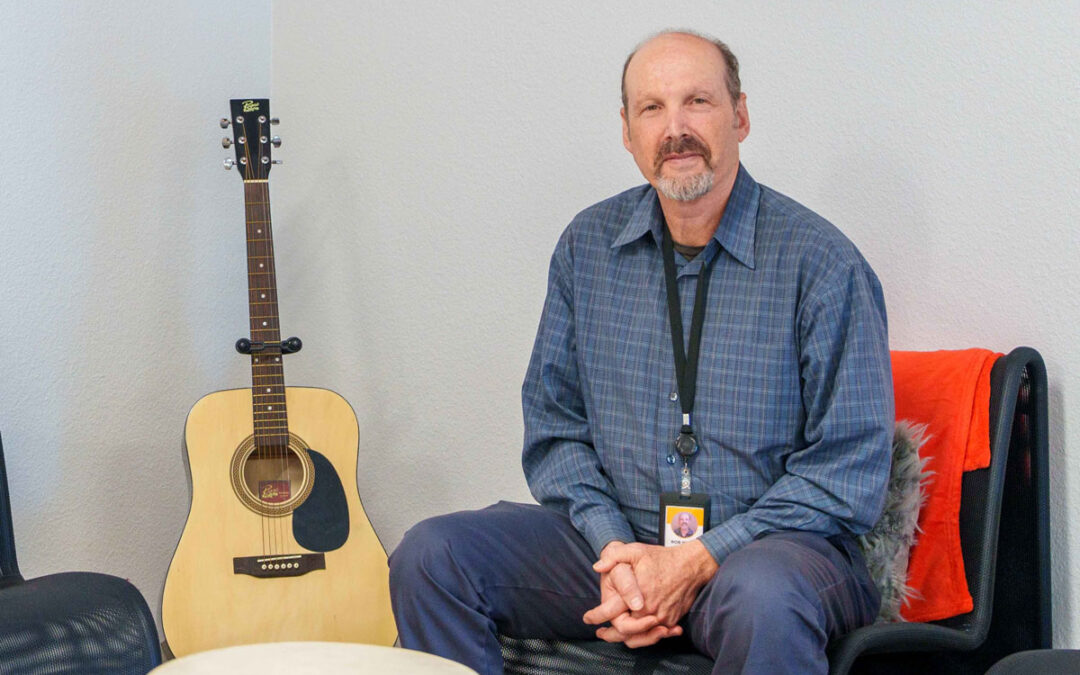Originally published in Napa Valley Features on March 1, 2025.
NAPA VALLEY, Calif. — Mentis, Napa’s longest-running mental health nonprofit, has opened a new $4 million facility designed to expand access to mental health care for the entire community. Formerly known as Family Services of the Napa Valley, the organization has been providing support since 1948, but this new space marks a significant evolution in how mental health care is offered in the region.
With a focus on prevention, early intervention and clinical services, Mentis serves individuals of all ages, from “5 to 105,” ensuring that anyone who needs support — whether it’s a structured therapy session or a safe place to talk — has somewhere to turn.
“This new space is about more than just increasing our capacity,” said Charlotte Hajer, development director at Mentis. “It’s about reimagining what community-based mental health care looks like — creating a place that’s welcoming, accessible and meets people where they are.”
A Space for Therapy, Prevention and Connection
Mentis has long provided mental health services across 20 school sites in Napa County, offering therapy and prevention programs where students already spend their time. With the new facility, students and others who might prefer an off-campus setting now have a dedicated space to seek care.
The expansion doubles the number of therapy rooms, growing from five to 10, while also providing specialized spaces for family therapy, peer support and prevention workshops. Beyond traditional therapy, the facility also offers:
- A community garden (set to open this spring)
- A sports court for wellness programs
- An art studio for creative expression and mental health workshops
- A dedicated peer-support space, where trained young adults will mentor teens in need of support
“We’ve always known that you can’t just wait for someone to hit a crisis before offering help,” said Jeni Olsen, director of prevention services. “This facility allows us to do more to prevent mental health crises by building wellness skills at every stage of life.”
Mentis’ countywide prevention initiative already reaches every seventh-grader in the Napa Valley Unified School District, teaching coping skills and resilience. The impact has been significant — according to Olsen, more than 90% of students report that they’ve learned strategies to help manage stress and emotions, based on survey data collected by the program.
“We’re seeing changes not only in how students feel about themselves but also in how they engage in the classroom,” Olsen said.
Collaboration and Community Support
Mentis is deeply connected to Napa’s broader network of social services, ensuring that those who walk through its doors get the help they need — even if that means referring them to another organization.
“If someone comes in and we’re not the right place for them, we don’t just send them away,” Olsen said. “We help them find the right resource.”
This “warm hand-off” approach means Mentis acts as a hub for connecting people with housing support, medical care, substance-abuse treatment and crisis services, hoping to ensure that no one falls through the cracks.
The new facility was made possible in part by a $1 million donation from the Napa Valley Vintners, which helped fund the naming of the youth wing of the building. Local philanthropy has always played a crucial role in supporting Mentis, and community leaders have rallied behind the effort to expand access to mental health care.
“By investing in the mental health and well-being of our young people, we are laying the foundation for a stronger, more resilient community for generations to come,” said Linda Reiff, President and CEO Napa Valley Vintners. “This wellness campus represents our shared vision of a place where everyone feels safe, supported and empowered to seek the help they need.”
Moving Forward in an Uncertain Time
As Mentis settles into its new home, the world around it is shifting. Changes in federal and state funding are creating new challenges, with uncertainty over how much support will be available for organizations such as Mentis in the coming years.
“There’s no doubt that the landscape is changing,” said Rob Weiss, executive director of Mentis. “But what remains constant is the need for these services — and our commitment to providing them.”
Beyond the uncertainty with federal funding, another unknown is Proposition 1, a statewide initiative that is restructuring mental health funding.
“Originally, Proposition 1 was about slicing the pie differently,” Weiss said. “But now we’re facing the real possibility that the pie itself is shrinking, and that’s creating a lot of uncertainty.”
While Proposition 1 was intended to redistribute funds within the mental health system, it didn’t account for simultaneous federal funding cuts, which are now expected to shrink the total available resources.
“We don’t know exactly what the future holds in terms of funding,” Weiss said. “But what we do know is that the need is higher than ever. And we’re prepared to do whatever it takes to keep providing these services.”
For the people Mentis serves, this uncertainty is adding to an already challenging time.
“Anxiety remains the No. 1 issue we see, especially among young people,” Olsen said. “And it’s not just about school, job or family stress — it’s climate anxiety, concerns about safety and uncertainty about the future. These aren’t abstract fears; they are deeply felt, affecting how people navigate daily life.”
Despite the challenges, there is a strong sense of hope and possibility at Mentis. The new campus provides not just more space, but new opportunities to innovate, collaborate and expand mental health care in ways that meet the evolving needs of the community.
Mackenzie Lovie, director of adult programs, sees this expansion as a chance to approach their work with fresh ideas.
“I think a silver lining in all of this is that we are here, in this beautiful new space, and it allows for a lot of creative thinking about how we move forward and meet the growing need,” Lovie said. “We have opportunities and options for how we pivot and do the best we can.”
At the same time, she acknowledges the weight of the moment and the growing demands on mental health professionals.
“These are very hard times to be in the mental health field, grappling with increasing demand and the ways it impacts the people we serve,” Lovie said. “But for the first time, Mentis is under one roof, and that’s a critical piece of how we move forward. We are a united front, and having that kind of moral support within our team makes a real difference.”
That sense of unity and shared purpose is what keeps the organization pushing forward, Hajer said.
“We built this facility because we believe in the future of mental health care in Napa,” Hajer said. “We’re ready to adapt, to think creatively and to keep finding ways to support the people who rely on us.”
Mentis is open to anyone seeking mental health services, whether through therapy, wellness programs or simply as a place to start a conversation about what support might look like. The 50+ person team remains focused on creating solutions, not just reacting to problems, ensuring that mental health care remains accessible, effective and rooted in the community.
“This is a space for everyone,” Weiss said. “And it’s here to stay.”
—
On March 5, Mentis will mark this new chapter with a ribbon-cutting ceremony.
Mentis, Napa’s Center for Mental Health Services, 1272 Hayes St., Napa;
707-255-0966 main; 707-710-9511 fax;
[email protected]; https://mentisnapa.org
Tim Carl is a Napa Valley-based photojournalist.


